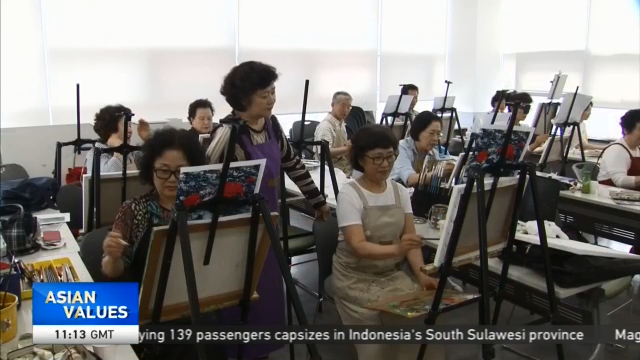
19:55, 03-Jul-2018
The Foundation of a Family: Shifting values under rapid economic modernization
Updated
19:52, 06-Jul-2018
02:53

Confucian teachings and practices are deeply rooted in South Korea. The concept of filial piety resonates throughout the East Asian nation. But with rapid economic modernization and development, family norms and values are shifting and the consequences could be dramatic. Shane Hahm has the report.
Living out the golden years in style.
Retirees at this community center spend the day enjoying their hobbies and new activities.
Many worked their entire lives saving up for retirement.
Their children have left the nest, and spare time is abundant.
KO YANG-MOK SENIOR RETIREE "My generation was only able to look forward. We didn't have opportunities to enjoy leisure time. We didn't have the time for self-development. But I always wanted to learn to paint someday, so I'm grateful for this facility."
But not all retirees have the luxury to enjoy retirement.
More than half of South Korea's senior population lives in poverty.
Many have spent their life savings on raising their children.
And it was expected that children would reciprocate for their aging parents.
SHANE HAHM SEOUL "Filial piety is the duty to take care of one's parents, elders, and ancestors and it's a strong pillar in Confucian philosophy. But family values and social gender roles are changing in South Korea. Younger workers are moving to cities seeking better jobs and more women are entering the workforce. That's made caring for one's parents a much more burdensome task both physically and financially."
PROF. LEE HO-SUN KOREA SOONGSIL CYBER UNIVERSITY "Difficult duties the younger generation were required to carry out in the past are turning into discontent, dissatisfaction, and in extreme cases, hatred toward a generation requiring care. This goes beyond conflict. This is creating serious social corrosion."
Government polls show less than 40% of children feel the need to take care of their parents compared to 90% at the turn of the century.
The elderly suicide rate has tripled in the same time frame.
Many are calling for more government support for seniors.
But experts say that only shifts the responsibility and filial piety will diminish more.
PROF. LEE HO-SUN KOREA SOONGSIL CYBER UNIVERSITY "If society is unable to fully care for the elderly and individuals neglect their responsibilities, the group that will suffer the most are the senior citizens that actually require the care. The hardships and social dissatisfaction they face will be enormous and the mistrust and betrayal toward youngsters will only lead to more social division."
One-fifth of South Korea's population will be over the age of 65 by 2030.
Weighing traditional values with new social norms will be a challenge for generations to come. Shane Hahm, CGTN.

SITEMAP
Copyright © 2018 CGTN. Beijing ICP prepared NO.16065310-3
Copyright © 2018 CGTN. Beijing ICP prepared NO.16065310-3